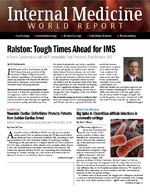Cardio effects of pioglitazone may be less than rosiglitazone
Cardio effects of pioglitazone may be less than rosiglitazone
New research shows that two widely used type 2 diabetes medications may have different impacts on incidence of myocardial infarction
By Kurt Ullman
Rosiglitazone and pioglitazone are widely used in treatment of type II diabetes and are known to have some adverse cardiovascular effects. A study published in the British Medical Journal suggests that rosiglitazone may have more impact on heart health than pioglitazone.
“Both medications have been found to increase the risk of heart failure, and rosiglitazone is also thought to increase the risk of myocardial infarction,” said lead author Yoon K Loke, senior lecturer in clinical pharmacology at the University of East Anglia, Norwich, UK. “These concerns spurred regulatory action, including their suspension by European Medicines Agency, and restricted use by the Food and Drug Administration. It is unclear if pioglitazone is a safer alternative for patients who have to stop taking rosiglitazone.”
Researchers conducted a meta-analysis of cardiovascular outcomes from 16 observational studies (4 case-control and 12 retrospective cohort studies). Around 810,000 thiazolidinedione users were evaluated after a detailed review of 189 citations. Compared with pioglitazone, use of rosiglitazone significantly increased the odds of myocardial infarction (n=15 studies; odds ratio [OR] 1.16, 95% confidence interval [CI] 1.07 to 1.24; P< 0.001; I2=46%), congestive heart failure (n=8; 122, 1.14 to 1.31; P<0.001; I2=37%), and death (n=8; 1.14,1.09 to 1.20; P<0.001; I2= 0%). Numbers to treat to harm were dependent upon the population at risk, suggesting 170 excess infarctions, 649 excess cases of heart failure, and 431 extra deaths for every 100,000 patients getting rosiglitazone instead of pioglitazone.
“Although we suspected that rosiglitazone was possibly more harmful with respect to cardiovascular events, we were surprised to also find a significant increase in the risk of death compared to pioglitazone,” said Dr. Loke. “For the practicing clinician, it is clear that the use of thiazolidinediones is problematic, and that rosiglitazone is the more harmful agent. For patients that definitely need a thiazolidinedione, the clinician should opt for pioglitazone wherever possible, and the rosiglitazone should be stopped.”
Author Disclosures: Partial funding for this article came from that National Institutes of Health. All authors say they have no relationships with any company that might have an interest in the submitted work.
Source:Loke YK, et al. Comparative cardiovascular effects of thiazolidinediones: Systematic review and meta-analysis of observational studies. BMJ. 2011; 342: d1309. doi: 10.1136/bmj.d1309.
